
A new study has revealed that a lot of self-identified heterosexuals actually feel same-sex attraction. It’s just the latest proof that, despite our breathless fascination with labels, human sexuality rarely boils down to a straight-gay binary.
The study, published in the Archives of Sexual Behavior, examined data from 2,900 self-identified heterosexuals in Spain between the ages of 18 and 40 who had participated in a 2017 online survey about sexual orientation and behavior. About 70 percent of the participants were women and 30 percent were men.
The survey asked participants if they ever considered same-sex individuals to be good-looking, if they ever dreamed or fantasized about same-sex sexual encounters, or if they ever had same-sex sexual intercourse (including touching and masturbation). The survey also asked participants about their discomfort with their own sexual orientations and the prospect of engaging in same-sex sexual activity.
Lead researcher Juan E. Nebot-Garcia and his colleagues found that 31.5% of women and 13.2% of men reported feeling attracted to same-sex individuals. Women were more likely than men to find same-sex people attractive and were more open than men to engage in same-sex sexual activity — though men and women felt most open to kissing rather than oral or anal sex.
How about we take this to the next level?
Our newsletter is like a refreshing cocktail (or mocktail) of LGBTQ+ entertainment and pop culture, served up with a side of eye-candy.
Researchers also found that if heterosexual people of either sex find same-sex individuals physically attractive, they were also over 10 times more likely than non-attracted heterosexuals to feel discomfort with their own sexual orientations. If a man desired a same-sex sexual encounter, he was more than 55 times more likely to feel discomfort with his own sexual orientation.
Researchers said this discomfort is likely because same-sex attraction and sexual desire create “discordant experiences,” “uncertainty,” and “ambiguity” about a heterosexual person’s self-concept. Heterosexual people may also fear social backlash if they identify or act in any way other than heterosexually.
Interestingly, women, older people, people with higher levels of education, and those who had already had erotic same-sex experiences reported lower levels of discomfort about their own sexual orientations. Heterosexual women also expressed a greater tolerance and more positive attitudes toward homosexuality than heterosexual men.
There’s a lot to unpack in the findings. Foremost, even though the study took place in Spain, it shows something that has long been true in the U.S.: Many people still self-identify as heterosexual, even if they’ve experienced desire for or sex with same-sex partners.
Also, it’s not surprising that more heterosexual women than heterosexual men reported having had same-sex attraction and sexual desires. That’s likely because our hetero-male-dominated society tolerates same-sex female sexual encounters and is more comfortable seeing them in public and media, since women kissing turns straight guys on and seems non-threatening to them.
The study’s authors noted that, even though the Spanish government has passed progressive LGBTQ+ rights legislation, anti-LGBTQ+ discrimination persists in society. This discrimination, researchers said, affects the sexual development of heterosexuals who experience any attraction or desire outside of heteronormativity (that is, outside of strict societal expectations of “normal” heterosexuality).
Put another way, part of the reason heterosexuals feel so scared about having same-sex attraction or sexual desires is that they’re afraid society will treat them like sh*t for being gay or bi. As always, queerphobia, not queerness, is the real problem.
Related:
I want to have a gay orgy for my 30th birthday… should I tell my girlfriend?
“I’m going to be turning 30 next month and I have this weird birthday fantasy.”


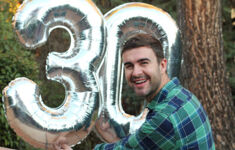


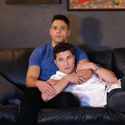



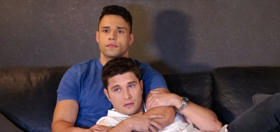




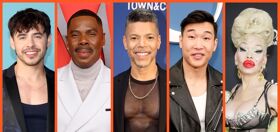
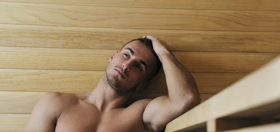

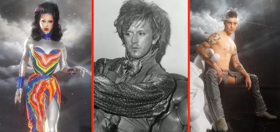
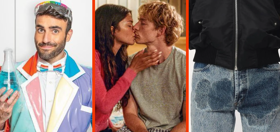
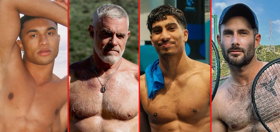
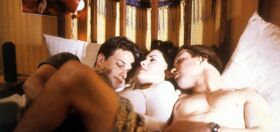
Cam
Stop with the click bait and going back to the burned out old “No labels” attempts.
This is less a commentary on sexual fluidity and much more a comment on how bigotry and hatred prevents people from being honest about their sexuality.
Those folks aren’t straight, they’re bi, or closeted gays and lesbians, or pan or demi, etc. but they say they’re “Straight” because it’s easier and they don’t get harassed by family, friends, or right wing politicians.
inbama
Given it’s an online survey rather than a peer-reviewed study involving random subjects better reflecting the general population, the results are of limited value.
Still, I’m glad to see at least someone involved in Queerty reads the Archives of Sexual Behavior. Following actual research by psychologists and sexologists is a better way to understand ourselves than believing all the gibberish from umbrella activists.
MrMichaelJ
The quickest way to incorrectly ascertain how gay a guy is is to ask him
GlobeTrotter
This so-called “study” isn’t worth the paper it’s printed on. What was the demographics of the sample group? Was there a control group? At most, this should only be referred to an unscientific survey as whatever results can be drawn are very limited and inconclusive.
In my experience people feel attraction to BOTH sexes, however to varying degrees, which makes us a bisexual species. Whether people act or are allowed to act on their sexual attractions however, is governed by a complex amalgamation of societal, cultural and familial rules and regulations.